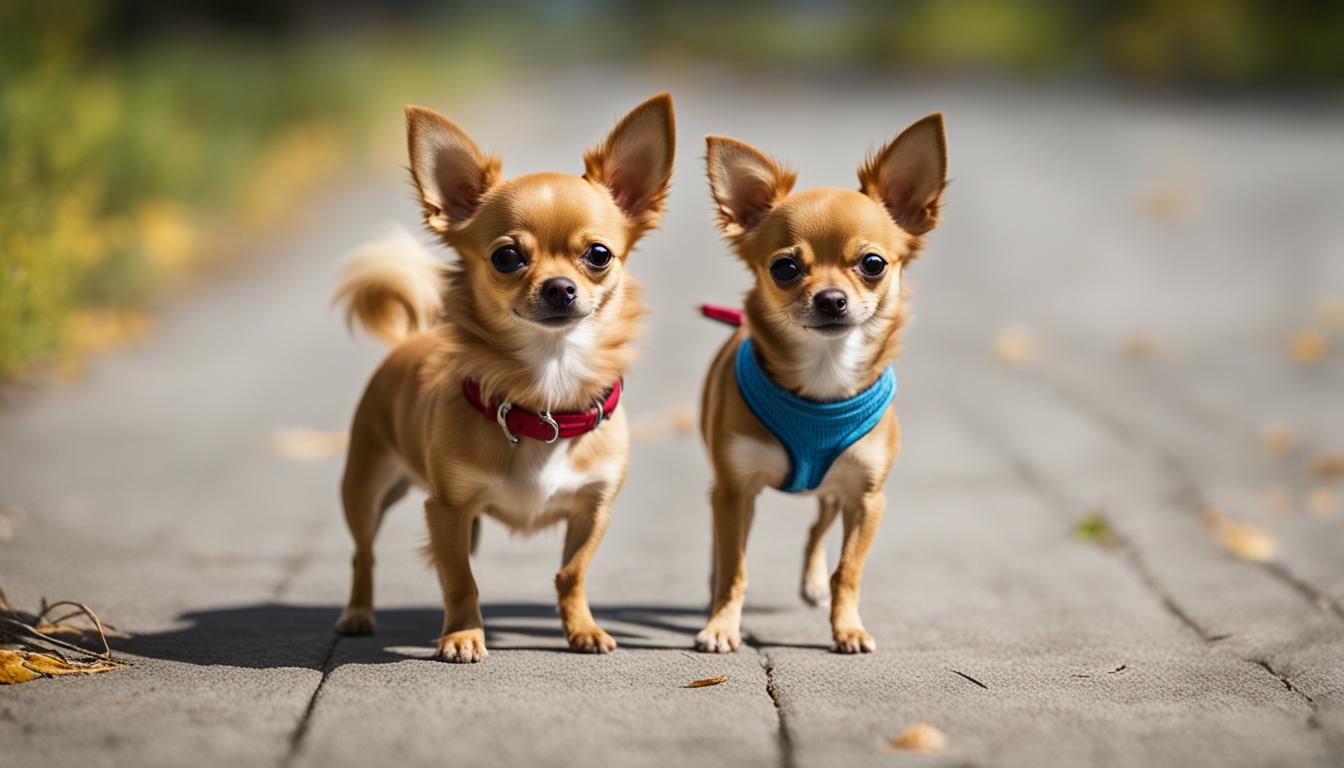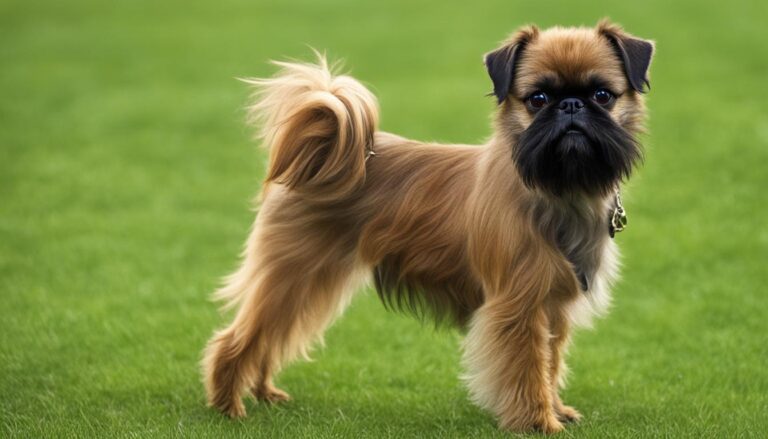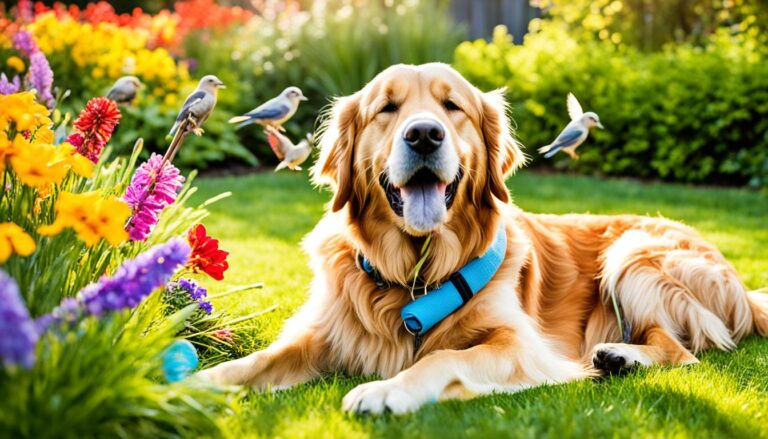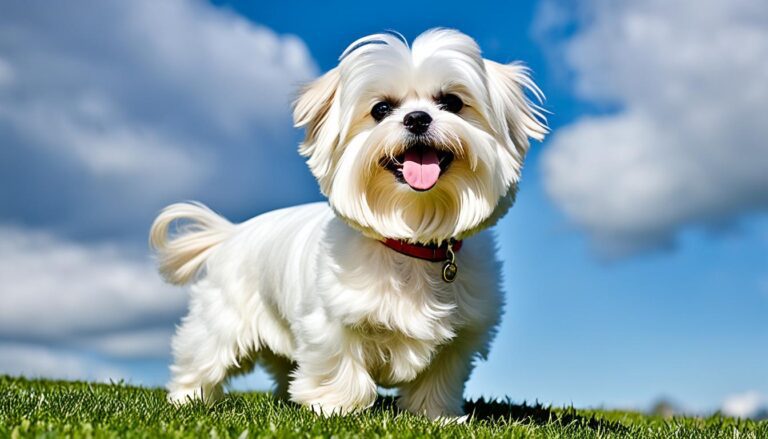Chihuahua Full Description – Toy Breed Insights
Did you know that Chihuahuas, the beloved toy breed, weigh just 3 to 6 pounds? Despite their small size, these pint-sized powerhouses are known for their feisty attitude, loyalty, and love for attention. Chihuahuas are surprisingly active and can be quite playful, making them excellent companions for people of all ages and lifestyles.
Key Takeaways:
- Chihuahuas are small dogs, weighing only 3 to 6 pounds.
- They have feisty and independent personalities, but are also loyal and affectionate towards their owners.
- Chihuahuas come in two varieties: smooth-haired and longhaired, with different grooming needs.
- They make excellent apartment dogs and get along well with the whole family.
- Prioritize adopting from rescue organizations or reputable breeders for a healthy Chihuahua.
Chihuahua Origins and History
The Chihuahua is one of the oldest breeds of dog in the world, believed to have originated in Mexico over 3,000 years ago. The breed’s ancient origins can be traced back to the Techichi dogs, which were favored by the Toltec civilization. The Techichi dogs were then further developed into smaller dogs by the Aztecs, who valued them for their companionship and believed they possessed mystical powers.
The Chihuahua’s Mexican origins are deeply intertwined with the ancient civilizations of Mexico, particularly the Aztec civilization. The Aztecs held the Chihuahua in high regard, using them in religious ceremonies and rituals. These small dogs were considered sacred and were often buried alongside their human owners, believed to guide their souls to the afterlife.
Throughout history, the Chihuahua’s small size and endearing personality captivated people around the world. In the 19th century, American travelers visiting Mexico encountered these charming dogs and began bringing them back to the United States. The breed gained popularity among Americans, and by the late 1800s, Chihuahuas could be found in households across the country.
The recognition of the Chihuahua as a breed came in 1908 when it was officially recognized by the American Kennel Club. Since then, Chihuahuas have become one of the most beloved and recognizable dog breeds globally, known for their small size, lively temperament, and unique appearance.
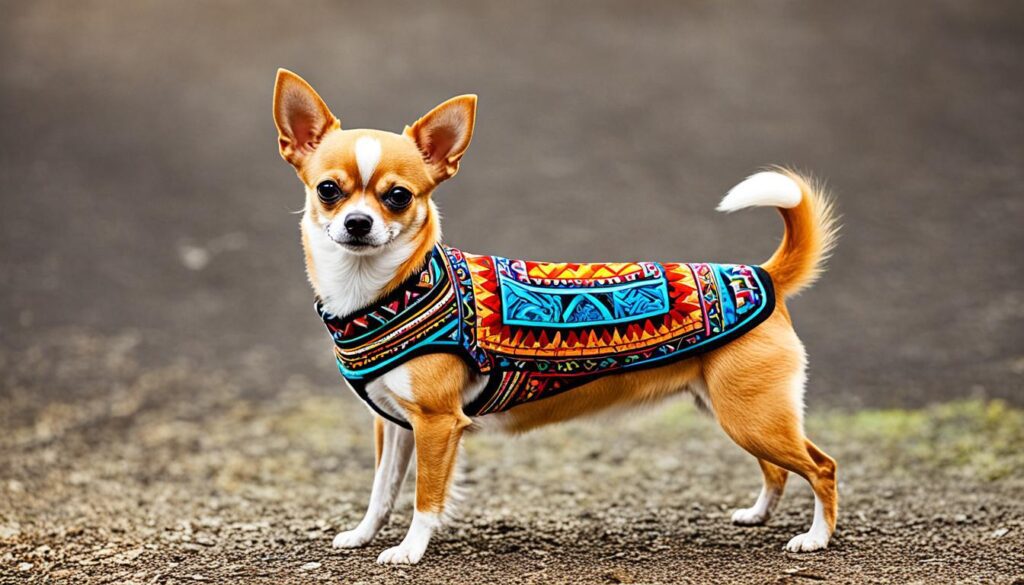
The ancient origins and rich history of the Chihuahua breed add depth and significance to their presence in our lives today.
Chihuahua Size, Weight, and Appearance
Chihuahuas are a small breed dog, known for their petite size and charming appearance. These pint-sized pups typically stand at a height ranging from 5 to 8 inches and weigh between 3 to 6 pounds. Despite their small stature, Chihuahuas are packed with personality and make excellent companions for individuals and families alike.
One of the distinguishing physical characteristics of Chihuahuas is their adorable rounded head, complemented by large, expressive eyes that radiate both intelligence and affection. Their erect, pointed ears add to their alert and curious nature, making them keen observers of their surroundings.
Chihuahuas come in a variety of coat colors, allowing prospective owners to choose the perfect canine companion to fit their style. These colors range from fawn, white, and blonde to black and tan, and even patched coats. The diversity of coat colors adds to the charm and uniqueness of each individual Chihuahua.
The breed also has two coat varieties – smooth-haired and long-haired. Smooth-haired Chihuahuas have short, sleek coats that require minimal grooming, making them convenient for owners who prefer low-maintenance pets. On the other hand, long-haired Chihuahuas boast longer, flowing fur that requires regular brushing to prevent matting. The extra grooming effort is well worth it for those who appreciate the elegant and luxurious appearance of a long-haired Chihuahua.
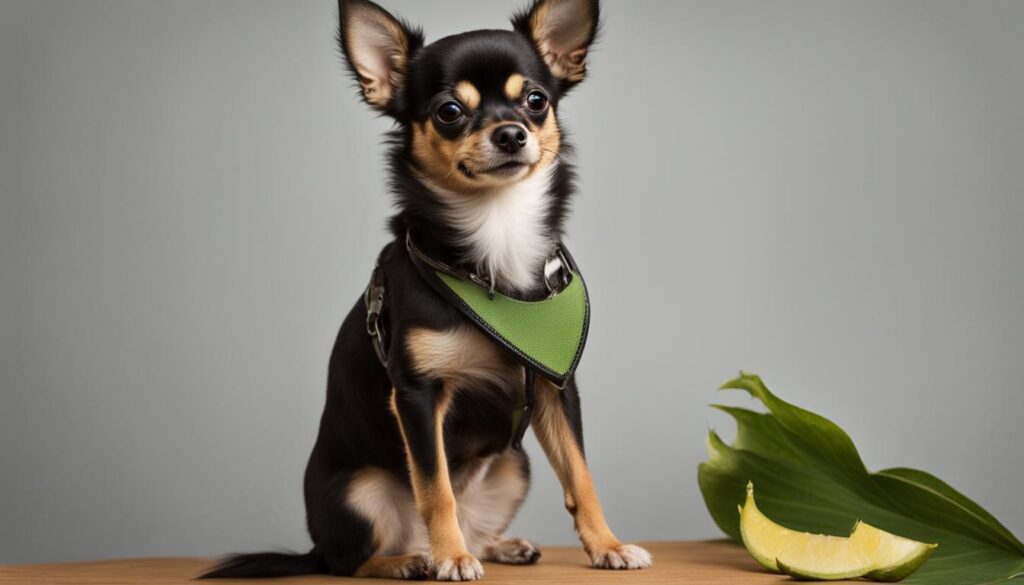
Overall, Chihuahuas are small in size but big in personality. Their distinctive physical characteristics and various coat colors make them truly eye-catching and charming. Whether you prefer the smooth-haired or long-haired variety, these little dogs are sure to steal your heart!
Chihuahua Temperament and Personality
Chihuahuas have a feisty and independent temperament that sets them apart from other breeds. Their small size doesn’t limit their unique personality traits. While they may be pint-sized, Chihuahuas possess a loyal and affectionate nature that endears them to their owners.
Despite their small stature, Chihuahuas can form strong bonds with their human companions and become fiercely protective. Their loyalty knows no bounds, making them ideal companions for individuals or families seeking a steadfast and devoted furry friend.
Chihuahuas are known for their alert and intelligent nature. This intelligence makes them quick learners and responsive to positive reinforcement training methods. With patience and consistency, they can quickly grasp commands and develop good behavior habits.
Chihuahuas can also be good with children, but their small size and delicacy may make them unsuitable for rough play. It is important to educate children about handling and interacting with Chihuahuas in a gentle and respectful manner to avoid unintentional harm.
Despite their independent streak, Chihuahuas thrive on attention and affection from their owners. They enjoy curling up on laps, snuggling under blankets, and being close to their loved ones. Their affectionate nature helps create strong bonds and makes them excellent companions for individuals or families of all ages.
Key Points:
- Chihuahuas have a feisty and independent temperament.
- They are known for their loyalty and affection towards their owners.
- Chihuahuas can be good with children, but require gentle handling.
- They are alert and intelligent, making them easy to train.
- Chihuahuas have big personalities despite their small size.
Chihuahua Health Issues
Chihuahuas, like any other breed, may experience certain health conditions. While they are generally healthy dogs, it’s important to be aware of common health issues that can affect them. Understanding these conditions will help you provide the best care for your Chihuahua and ensure their overall well-being.
1. Luxating Patellas
Luxating patellas, or kneecap problems, are common in small breed dogs like Chihuahuas. This condition occurs when the kneecap becomes dislocated or slips out of place. It can cause lameness, pain, and difficulty in walking. Regular exercise and maintaining a healthy weight can help prevent or minimize the severity of luxating patellas in Chihuahuas.
2. Intervertebral Disc Disease (IVDD)
Intervertebral disc disease is a spinal condition that occurs when the discs between the vertebrae degenerate or rupture. Chihuahuas are predisposed to this condition due to their long backs. Symptoms can range from mild pain and difficulty in movement to severe paralysis. Gentle exercise, avoiding jumping from heights, and providing ramps or stairs for access to elevated surfaces can help reduce the risk of IVDD in Chihuahuas.
3. Hypoglycemia
Due to their small size, Chihuahuas are susceptible to hypoglycemia, a condition characterized by low blood sugar levels. Hypoglycemia can cause weakness, trembling, seizures, and even coma if left untreated. Offering small, frequent meals throughout the day and avoiding long periods without food can help prevent this condition. It’s important to monitor your Chihuahua’s eating habits and seek veterinary care if you suspect hypoglycemia.
4. Dental Care
Dental problems are common in Chihuahuas, as their small mouths are prone to overcrowding and dental plaque buildup. Neglecting dental care can lead to gum disease, tooth loss, and potential complications in other organs. Regular brushing, dental check-ups, and providing chew toys or dental treats can help maintain your Chihuahua’s oral health and prevent dental issues.
Regular veterinary check-ups, a balanced diet, and appropriate preventative measures are essential for keeping your Chihuahua healthy. Being aware of these common health conditions and providing proactive care will give your Chihuahua the best chance at a long and happy life.
Chihuahua Grooming Needs
The grooming needs of Chihuahuas depend on their coat type. There are two varieties of Chihuahuas: short-haired and long-haired. Let’s explore the specific grooming requirements for each type.
Short-Haired Chihuahua
A short-haired Chihuahua has a smooth and sleek coat that requires minimal grooming. Regular brushing helps remove loose hairs and keeps the coat healthy and shiny. Use a soft-bristle brush or a grooming mitt to gently brush their coat once or twice a week. This will prevent any tangles or matting.
In terms of bathing, short-haired Chihuahuas generally only need occasional baths. Aim to bathe them once every 2-3 months or when they get dirty. Use a gentle dog shampoo formulated for sensitive skin and thoroughly rinse to avoid any residue that can cause skin irritation.
Long-Haired Chihuahua
A long-haired Chihuahua has a more luxurious coat that requires regular brushing to prevent matting and tangling. Long-haired Chihuahuas should be brushed at least two to three times a week to keep their coat in good condition.
When brushing a long-haired Chihuahua, use a soft slicker brush or a comb with wide teeth to gently remove any tangles or mats. Pay extra attention to the areas behind their ears, under their armpits, and around their tail, as these are common areas where tangles can occur.
In addition to regular brushing, long-haired Chihuahuas may require more frequent baths. Aim to bathe them once every 4-6 weeks to keep their coat clean and vibrant. As with short-haired Chihuahuas, use a gentle dog shampoo and rinse thoroughly.
In some cases, long-haired Chihuahuas may benefit from professional grooming services, especially if their coat becomes heavily matted or if their owner prefers a more intricate hairstyle. A professional groomer can trim their coat, tidy up the fur around their face and paws, and ensure their coat is well-maintained.
Remember, regardless of their coat type, it is crucial to establish a grooming routine from a young age with positive reinforcement. This will help Chihuahuas become comfortable with brushing, bathing, and overall grooming activities.
Chihuahua Training Tips
Training a Chihuahua is an important aspect of their development and behavior. These intelligent dogs can be easily trained using positive reinforcement methods, which involve rewarding desired behaviors with treats, praise, or playtime. Here are some essential training tips to help you shape your Chihuahua into a well-behaved and obedient companion.
Socialization
Socialization plays a crucial role in ensuring that your Chihuahua is comfortable in various environments and can interact positively with different people and animals. Expose your Chihuahua to a wide range of experiences, such as different sounds, sights, and smells. Encourage positive interactions and reward good behavior during socialization exercises.
Obedience Training
Early obedience training is essential for establishing basic commands and good behaviors in your Chihuahua. Start with simple commands like “sit,” “stay,” and “come.” Use positive reinforcement techniques, such as treats and praise, to reward your Chihuahua for following commands. Keep training sessions short and frequent, as Chihuahuas have a short attention span.
House Training
House training your Chihuahua is an important aspect of their overall training. Start house training as early as possible by establishing a regular routine for feeding, bathroom breaks, and exercise. Take your Chihuahua outside to their designated bathroom area frequently and reward them for eliminating in the appropriate spot. Consistency, patience, and positive reinforcement are key to successful house training.
Proper training and socialization will help your Chihuahua become a well-rounded and obedient companion.
Remember, training takes time and patience. Chihuahuas can be stubborn at times, so it’s important to remain consistent and avoid punishment-based training methods. Always use positive reinforcement to encourage desired behaviors and discourage unwanted ones. With proper training and socialization, your Chihuahua will grow into a happy and well-behaved member of your family.
Chihuahua Training Tips:
- Use positive reinforcement methods, such as treats and praise, to train your Chihuahua.
- Expose your Chihuahua to different environments and socialize them with people and animals.
- Start obedience training early and focus on basic commands.
- Establish a routine for house training and reward your Chihuahua for eliminating in the appropriate spot.
- Be patient and consistent in your training efforts.
| Training Tips | Description |
|---|---|
| Positive Reinforcement | Use rewarding techniques like treats and praise to reinforce desired behaviors. |
| Socialization | Expose your Chihuahua to various experiences to ensure they are comfortable in different environments and with different people and animals. |
| Obedience Training | Teach your Chihuahua basic commands using positive reinforcement and keep training sessions short and frequent. |
| House Training | Establish a routine and consistent bathroom breaks to successfully house train your Chihuahua. |
Chihuahua Care Guidelines
Proper care is essential for the health and well-being of Chihuahuas. To ensure that your Chihuahua lives a happy and healthy life, it is important to follow these care guidelines:
- Diet and Nutrition: Provide your Chihuahua with a balanced diet that is tailored to their size, age, and activity level. High-quality dog food that is rich in protein and nutrients is recommended. Avoid overfeeding, as Chihuahuas are prone to weight gain.
- Exercise Needs: While Chihuahuas have minimal exercise needs, they still require daily walks or playtime to stay mentally and physically stimulated. Regular exercise helps prevent obesity and promotes overall well-being.
- Mental Stimulation: Chihuahuas are intelligent dogs and need mental stimulation to prevent boredom. Engage them with puzzle toys, interactive games, and training sessions to keep their minds active and engaged.
- Veterinary Care: Regular veterinary check-ups are crucial for maintaining your Chihuahua’s health. Ensure that they are up to date on vaccinations, heartworm prevention, and flea and tick control. Dental care is also important for their oral hygiene.
- Safe Living Space: Chihuahuas thrive in indoor environments and should have a safe and comfortable living space. Provide them with a soft bed, access to fresh water, and a designated area for elimination needs.
Incorporating these care guidelines into your Chihuahua’s daily routine will help promote their overall well-being and ensure that they live a happy and healthy life.
Tips for Choosing a Chihuahua
When it comes to choosing a Chihuahua, it’s essential to make informed decisions to ensure the best outcome for both you and the dog. Whether you decide to adopt from a rescue organization or purchase from a breeder, responsible pet ownership should be your top priority. Here are some tips to guide you in selecting the perfect Chihuahua companion:
- Research reputable breeders: Look for breeders who prioritize the health and well-being of their dogs. They should provide proper care, regular veterinary check-ups, and ensure suitable living conditions for their Chihuahuas.
- Consider adoption: Adopting from rescue organizations not only gives a deserving Chihuahua a second chance at a loving home but also helps reduce pet overpopulation. These organizations often thoroughly assess their dogs, ensuring they are ready for adoption.
- Visit the breeder or shelter: Arrange a visit to the breeder’s facility or the shelter to meet the Chihuahuas and observe their living conditions. This firsthand experience will give you valuable insights into the dog’s environment and overall well-being.
- Ask questions: Don’t hesitate to inquire about the dog’s history, health records, and any specific concerns you may have. A reputable breeder or organization will be transparent and willing to provide all necessary information.
- Observe behavior: Spend time with the Chihuahuas you are considering and observe their behavior. Look for signs of good temperament and socialization, such as friendliness, curiosity, and willingness to interact.
- Consider compatibility: Assess the compatibility between the Chihuahua and your lifestyle and family. Consider factors such as activity level, energy, and potential compatibility with children or other pets in your household.
By following these tips and considering reputable breeders or adoption, you can make a well-informed decision when choosing a Chihuahua. Remember, responsible pet ownership plays a vital role in ensuring the happiness and well-being of your new companion.
Conclusion
The Chihuahua is a remarkable breed that captivates the hearts of individuals and families alike. With their small size and big personality, Chihuahuas make excellent companions for all ages. Their feisty attitude, loyalty, and affection towards their owners create deep bonds of love and companionship.
Chihuahuas are low-maintenance when it comes to grooming and exercise, making them well-suited for apartment living. Regular veterinary check-ups, a balanced diet, and proper grooming and training are essential for their overall health and happiness.
Understanding the history, characteristics, and care needs of Chihuahuas is crucial for potential owners. By making informed decisions and providing a loving and nurturing environment, we can ensure that these incredible dogs thrive and flourish in our homes.
FAQ
What are the characteristics of the Chihuahua breed?
Chihuahuas are known for their feisty attitude, loyalty, and love for attention. They are surprisingly active and playful despite their small size. They make excellent companions for people of all ages and lifestyles.
How did the Chihuahua breed originate?
The Chihuahua is one of the oldest breeds of dog in the world, believed to have originated in Mexico over 3,000 years ago. Their ancestors, the Techichi dogs, were favored by the Toltec civilization and later refined into smaller dogs by the Aztecs.
What is the size and weight of a Chihuahua?
Chihuahuas typically stand at 5-8 inches tall and weigh 3-6 pounds. They have a unique appearance with a rounded head, large eyes, and erect ears.
What is the temperament of a Chihuahua?
Chihuahuas have a feisty and independent temperament, but they are also loyal and affectionate towards their owners. They can be good with children, but their small size may make them unsuitable for rough play.
What are the common health issues in Chihuahuas?
Common health issues in Chihuahuas include luxating patellas, intervertebral disc disease, hypoglycemia, and dental problems. Regular veterinary check-ups and a balanced diet are important for their health.
What are the grooming needs of a Chihuahua?
The grooming needs of a Chihuahua depend on their coat type. Smooth-haired Chihuahuas require minimal grooming, while long-haired Chihuahuas need regular brushing to prevent matting.
How can I train a Chihuahua?
Chihuahuas are intelligent and can be easily trained using positive reinforcement methods. Starting obedience and house training from a young age, along with socialization, is important for their development.
What are the care guidelines for a Chihuahua?
Chihuahuas require a balanced diet, regular exercise, and mental stimulation. They should have regular veterinary check-ups, vaccinations, and dental care to ensure their overall health.
How should I choose a Chihuahua?
When choosing a Chihuahua, prioritize adoption from rescue organizations or reputable breeders. Conduct thorough research, ask questions about the dog’s history and health, and observe their behavior to ensure compatibility with your lifestyle and family.

